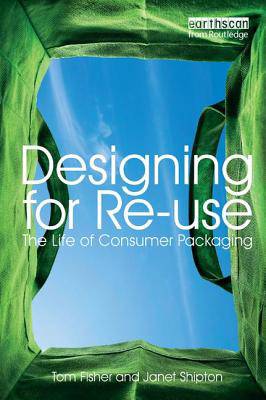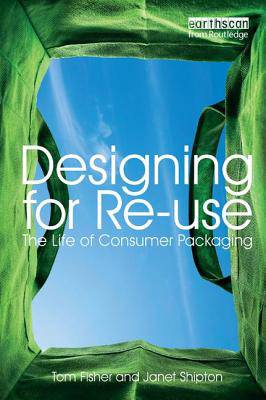
- Retrait gratuit dans votre magasin Club
- 7.000.000 titres dans notre catalogue
- Payer en toute sécurité
- Toujours un magasin près de chez vous
- Retrait gratuit dans votre magasin Club
- 7.000.0000 titres dans notre catalogue
- Payer en toute sécurité
- Toujours un magasin près de chez vous
Designing for Re-Use
The Life of Consumer Packaging
Tom Fisher, Janet ShiptonDescription
Packaging is ephemeral - its purpose is to be 'wasted' once we've removed the product it contains. Whilst we are encouraged to 'reduce, re-use and recycle', Designing for Re-Use proposes that domestic re-use is the 'Cinderella' of this trinity, because it is under researched and little understood.
The re-use of packaging could have a significant effect on the quantity of material that enters the waste stream and the energy and consequently carbon that is expended in its production - every re-used item is another item not purchased. The authors demonstrate that we do re-use - but usually despite, rather than because of, the actions of government and designers. The book shows that by understanding the ways in which actions of this sort fit with everyday life, opportunities may be identified to enhance the potential for re-use through packaging design.
The authors itemize the factors that affect the re-use of packaging, and analyse the home as a system in which objects are processed. Some of these factors relate to the specifics of the design, including the type of materials used and the symbolism of the branding. Other factors are more obviously social - for instance the effects on re-use of different consumer orientations. The book provides practical guidance from a design perspective, in the context of real-life examples, to provide professionals with vital design recommendations and evaluate how a practice orientated approach to understanding consumers' behaviour is significant for moving towards sustainability through design.
Spécifications
Parties prenantes
- Auteur(s) :
- Editeur:
Contenu
- Nombre de pages :
- 186
- Langue:
- Anglais
Caractéristiques
- EAN:
- 9781844074884
- Date de parution :
- 09-12-09
- Format:
- Livre broché
- Format numérique:
- Trade paperback (VS)
- Dimensions :
- 155 mm x 229 mm
- Poids :
- 317 g

Les avis
Nous publions uniquement les avis qui respectent les conditions requises. Consultez nos conditions pour les avis.






